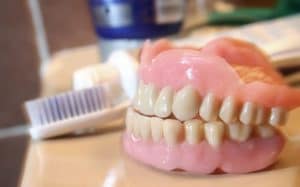There are many reasons people get dentures. Some people want to have new dentures to improve their appearance. This usually happens with people who have some missing teeth. Missing a tooth makes you look older and it makes the face look ‘hollow’ and shorter. The dentures help you to look younger and they fill out your facial features. They also help you to speak and eat more easily.

You can care for your teeth and still find yourself needing dentures at some point because of an accident for example. Alternatively, it could be an illness that causes you to lose teeth. Gingivitis and dental cavities have been responsible for a lot of tooth loss. With cavities, there could be so much decay that the only way forward is removing the tooth. Whatever the reason, dentures prove to be an invaluable tool for your dental health and appearance. What do you do then when you find yourself needing new dentures? Here are the steps detailing the process:
Consultation and examination
After you have lost a tooth for whatever reason, you will need to schedule a consultation where the dental technician will carry out an examination. Here, the technician will be seeking to understand the primary reason you want a denture – whether it is to improve your smile, to be able to chew better. Here, give as many details as you can; it will help them to understand your expectations. During this step, the technician should be able to address all your concerns so feel free to ask whatever you need to know.
Preparing your mouth
Here, they will examine your mouth thoroughly to make sure that everything is in order. Things like bony protrusions, a flabby gum or broken fragments of teeth will be addressed at this point. You may expect a few X-rays of your teeth to be taken to make sure that there are no abnormalities beneath your bones and gums. In some cases, your dentist may give you temporary dentures. You might feel some discomfort but it subsides with time.
Fitting your denture
During the fitting of your dentures, the technician will take a mold of your mouth. This mold helps to create ones that are suited for you. They may also use wax blocks to create bite molds that help to determine whether your dentures will be comfortable to use. In some cases, you may get a wax model to help you start practising on the care for your dentures and to give you an idea of what the final fit will look like. As soon as the final denture is ready, it is fitted and you receive the final instructions for care.
Experiencing and adapting to your dentures
After your dentures are ready, the dentist may have you try them on first or to try them out until the next visit. The idea here is to see how they work and to make any adjustments that may be necessary. After the fitting, your facial muscles and your tongue may feel strange for a while. For some people, even everyday tasks like eating need practice. Be sure to take it slow to give yourself time to adjust.
The dentist will advise you on the cleansers that you may use at this point. Expect that learning to maintain the new dentures will take some time as you learn the best and easiest way to care for your dentures. As an additional piece of advice, buy soft foods to eat in the first few weeks of adjustment. Your mouth will thank you for it.
Deciding to get dentures is the first step into what can be a rewarding adventure. If you have decided to go that way, contact your local denture specialist today to see how they can help you with new dentures.
